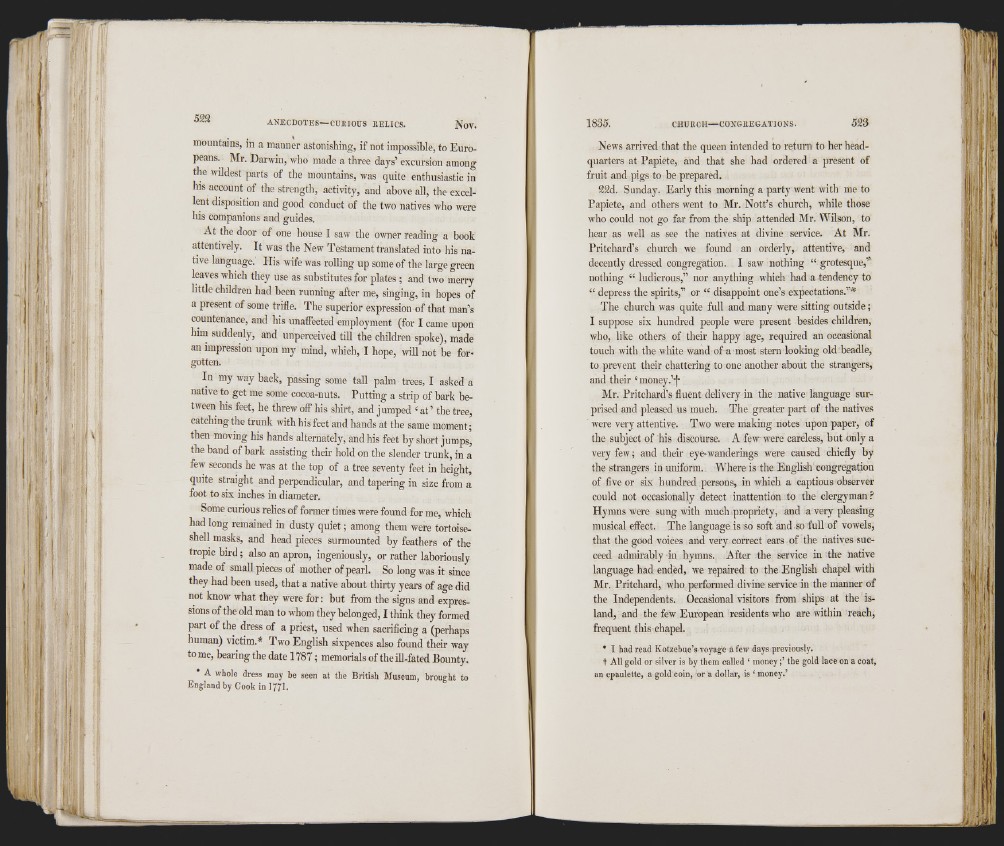
i'i 7
■W'r t
ri'i 'i
i; I 'l
,1 il
I At
Nov.
mountains, in a manner astonishing, if not impossible, to Europeans.
Mr. Darwin, who made a three daj's’ excursion among
the wildest parts of the mountains, was quite enthusiastic in
Ins account of tlie strength, activity, and above all, the excellent
disposition and good conduct of the two natives who were
his companions and guides.
At the door of one house 1 saw the owner reading a book
attentively. It was the New Testament translated into his native
language. His wife was rolling up some of the large green
leaves which they use as substitutes for plates ; and two merry
little children had been running after me, singing, in hopes of
a present of some trifle. The superior expression of that man’s
countenance, and his unaffected employment (for I came upon
him suddenly, and unperceived till the children spoke), made
an impression upon my mind, which, I hope, will not be forgotten.
In my way back, passing some tall palm trees, I asked a
native to get me some cocoa-nuts. Putting a strip of bark between
his feet, he threw off his shirt, and j umped ‘ at ’ the tree,
catching the trunk with his feet and hands at the same moment;
then moving his hands alternately, and his feet by short jumps,
the band of bai’k assisting their hold on the slender trunk, in a
few seconds he was at the top of a tree seventy feet in height,
quite straight and perpendicular, and tapering in size from a
foot to six inches in diameter.
Some curious relics of former times were found for me, which
had long remained in dusty quiet; among them were tortoiseshell
masks, and head pieces surmounted by feathers of the
tropic bird; also an apron, ingeniously, or rather laboriously
made of small pieces of mother of pearl. So long was it since
they had been used, that a native about thirty years of age did
not know what they were for: but from the signs and expressions
of the old man to whom they belonged, I think they formed
part of the dress of a priest, used when sacrificing a (perhaps
human) victim.* Two English sixpences also found their way
tome, bearing the date 1787 ; memorials of the ill-fated Bounty.
• A whole dress may be seen at the British Museum, brought to
England by Cook in 1771.
News arrived that the queen intended to return to her headquarters
at Papiete, and that she had ordered a present of
fruit and pigs to be prepared.
22d. Sunday. Early this morning a party went with me to
Papiete, and others went to Mr. Nott’s church, while those
who could not go far from the ship attended Mr. Wilson, to
hear as well as see the natives at divine service. At Mr.
Pritchard’s church we found an orderly, attentive, and
decently dressed congregation. I saw nothing “ grotesque,”
nothing “ ludicrous,” nor anything which had a tendency to
“ depress the spirits,” or “ disappoint one’s expectations.”*
The church w'as quite full and many were sitting outside;
I suppose six hundred people were present besides children,
who, like others of their happy age, required an occasional
touch with the white wand of a most stern looking old beadle,
to prevent their chattering to one another about the strangers,
and their ‘ money.’j-
Mr. Pritchard’s fluent delivery in the native language surprised
and pleased us much. The greater part of the natives
were very attentive. Two were making notes upon paper, of
the subject of his discourse. A few were careless, but only a
very few; and their eye-wanderings were caused chiefly by
the strangers in miiform. Where is the English congregation
of five or six hundred persons, in which a captious observer
could not occasionally detect inattention to the clergyman.?
Hymns were sung with much propriety, and a very pleasing
musical effect. The language is so soft and so full of vowels,
that the good voices and very correct ears of the natives succeed
admirably in hymns. After the service in the native
language had ended, we repaired to the English chapel with
Mr. Pritchard, who performed divine service in the manner of
the Independents. Occasional visitors from ships at the island,
and the few European residents who are within reach,
frequent this chapel.
• I had read Kotzebue’s voyage a few days previously.
+ All gold or silver is by them called ‘ money;’ the gold lace on a coat,
an epaulette, a gold coin, or a dollar, is ‘ money.’
u
III